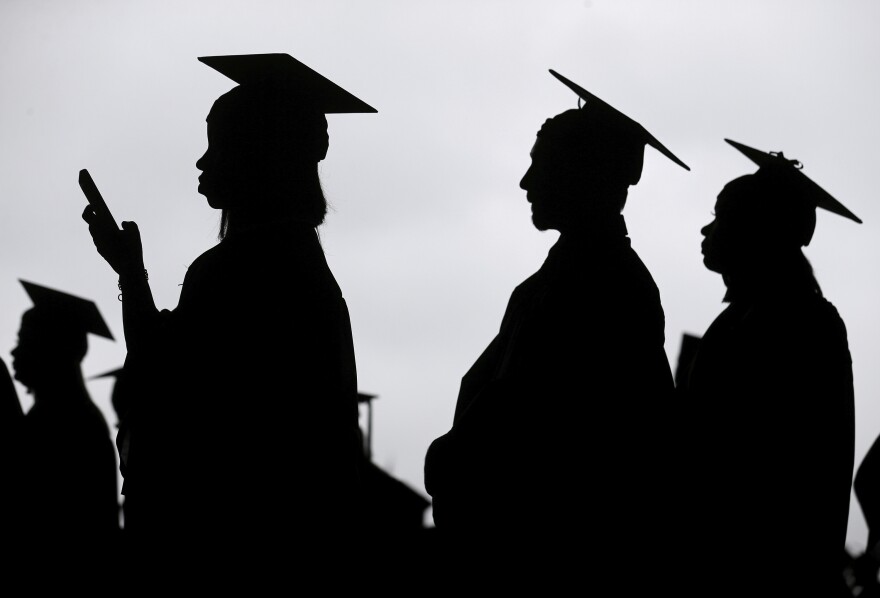The executive deputy director of the Illinois Board of Higher Education said when a college closes, there are disproportionate impacts on students of color. And most of the student body at the soon-to-close Lincoln College is Black.
Stephanie Bernoteit said it's a very disruptive event even with the best outcomes.
"We see that there are challenges in some cases transferring their credits, completing their studies. We see in some cases, that students may not be fully informed about how to access student loan discharge," said Bernoteit.
Loan forgiveness for students at a college that is closing runs through the U.S. Education Department. It may be possible to get loan forgiveness if a student at a closing institution transfers to another college.
Bernoteit said roughly 1,000 students at Lincoln College will have to go through a lot, adding there will be individualized help to transfer to a different institution.
“There will be a transfer fair for students so that they can have some in person assistance from representatives from those institutions on their campus in mid-April,” she said.
And since many students are not from Lincoln, she said there will be geographic diversity in the receiving institutions.
"There are going to be options in the Chicagoland area, and I think student choice in this process, which is certainly very disruptive and unexpected for learners, is really important. The intent is to provide an array of options," said Bernoteit.
Part of the disproportionate impact on college closures among students from under-represented groups, Bernoteit said, is because those students disproportionately attend for-profit institutions that tend to have higher costs and more sudden closures when they do fold.
“I urge IBHE and Lincoln College’s accreditor, the Higher Learning Commission (HLC), to ensure that students are not steered to predatory, for-profit colleges to complete their education and that all efforts are made to provide them options at quality public and not-for-profit institutions that are geographically convenient, said U.S. Senator Dick Durbin, D-Illinois.
For years, Durbin has been critical of for-profit institutions and urged more federal oversight of that sector of higher education.
Bernoteit said one of the important parts of developing so-called teach out plans is to consider the tuition and other costs associated with making a transfer.
“Oftentimes, receiving institutions will as a part of that, make special arrangements for financial assistance for students so that students are protected as much as possible in this challenging process,” said Bernoteit, noting IBHE also performs a coordinating role with other agencies.
“We also work with the Illinois Office of Attorney General and their student loan ombudsman to make sure students can access the Student Loan Hotline at the Attorney General's Office for questions about their student loans. And we also partner with the Community College Board and the Illinois Student Assistance Commission on options for students in our community college system, as well as relative to MAP grant funding and other questions,” said Bernoteit.
IBHE will take over student transcripts and other records in case graduates need copies even years from now.
“These things have very long-term trailing effects. Sometimes individuals are not in need of a transcript until for example, they make a career change, pursue graduate education, or perhaps need to renew a professional license in a new state,” said Bernoteit.
For students who graduate from an institution that closes, there also may be a stigma initially attached to that degree as if it came from a failed college.
“Graduating students in May of this year at Lincoln College can take some comfort in this. They are graduating from an accredited institution of higher education. Although that institution is not going to be there in the way that they knew it, as they crossed the stage, their degree does have value and will continue to have value moving forward,” said Bernoteit.
And over time, the loss of value of the degree diminishes as the closure fades from public consciousness.
Another part of the value of a college degree is in the alumni network maintained and facilitated by the institution. The connections that network provides, Bernoteit acknowledged, are not present for a shuttered college or university.
“Although the institution will not be there to support alumni networks, there still is the option for alumni themselves to support their fellow graduates informally through social media and other opportunities. It will be different, no doubt. But this is an institution with a long history and alumni who feel strong ties not only to the place but to each other,”she said.
At least five Illinois colleges have failed since 2016: MacMurray, Robert Morris, and Shimer among them. But Bernoteit said the IBHE has worked on 60 closures and consolidations in that period. Some institutions centered in other states had Illinois presences they terminated, though the home institution may have survived. She said they have a team of 10 people that works on smoothing the way for students with three people assigned to each institution.
“The pandemic has really exacerbated a number of challenges faced by higher education over the past several years,” said Bernoteit, including changing demographics of who goes to college, smaller high school graduating classes, and family incomes.


